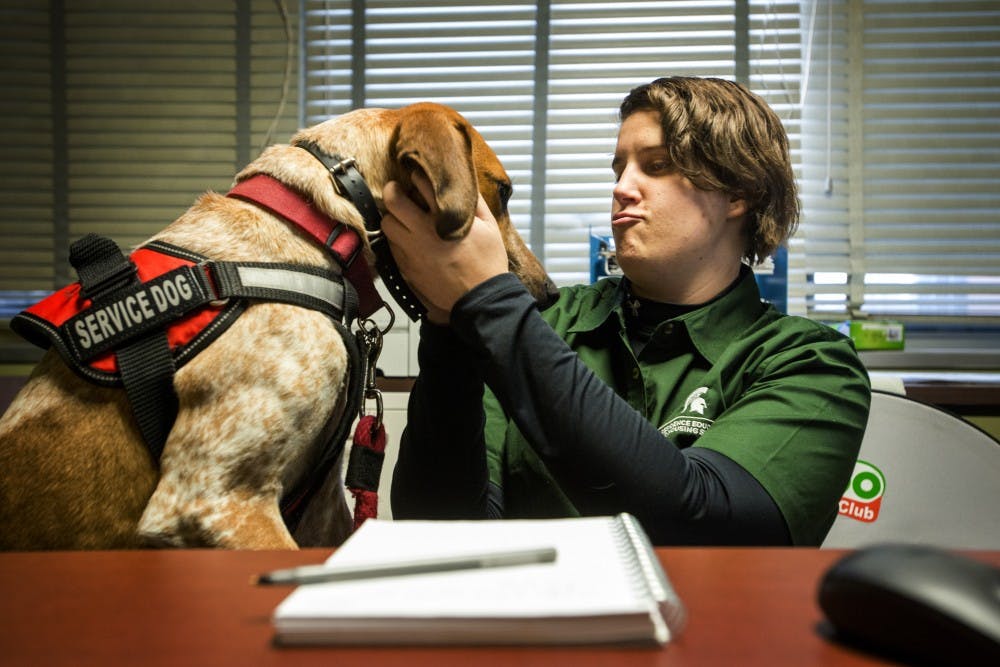Caitlin Thompson, a graduate student and facilities supervisor at MSU, said she sometimes faces more than 20 questions about her service dog, Charlie, every day.
Thanks to the service animal protections set out in the Americans with Disabilities Act, ADA, Thompson can bring Charlie with her to classes, work and businesses, but the constant questioning she faces there can be difficult to deal with.
“Once you have a service dog, you’re no longer part of a crowd,” Thompson said. “Wherever I go, I’m stared at. I’m going to be asked a question. Think of something relatively minor, like toilet paper stuck to your shoes or your fly’s unzipped, or something, and you notice it, and you quickly fix it, and you look around and, ‘oh, thank God, no one was looking.’ For me, that almost never happens. There’s always somebody looking because there’s a dog.“
Thompson said she is willing to answer questions when she feels up to it, but she asks that questioners respect her humanity.
“We’re people first,” Thompson said. “People with feelings and emotions and situations, and we’re just like everybody else. We’re not spokespeople, we’re not always at our best ... you have to remember that the fifth person who asks you the same question isn’t the same as the first person. It’s a completely different person who had no idea what the answer was, and I try and take that mentality. Some days, I’m more successful at it than others.“

“I was at a point where I wasn’t able to leave my house, there were a lot of things that I wasn’t able to do that having him made safer for me, you know, to be working full time and to be doing things,” Thompson said. “So for me, it finally outweighed the constant questions, the constant misunderstandings.”
Sharon Alston Ellis, the state of Michigan’s ADA compliance director, said service animals—both dogs and miniature horses—can be used to treat a variety of disabilities, both visible and invisible. Ellis, there is no requirement for registering service dogs, though the state of Michigan offers voluntary registration.
“Just because the service animal is something that is furry and usually cute and eats dinner, it’s not a pet,” Ellis said. “It’s a device, the same as a wheelchair, a cane, eyeglasses, a hearing aid, anything like that that assists someone with a disability to function more easily in the world. And you don’t have to register your crutches, or your cane, or your wheelchair, or your hearing aid. And so, if we don’t ask you to do all of that, then we don’t ask you to register your service animal.”
Though no special marking is required for service animals, Thompson dresses Charlie in a special harness that reads “Service Animal.” East Neighborhood facilities manager Chip Hornburg has had several residents with service animals, and he said the animals are usually seen wearing harnesses.
Service animals are welcome in MSU dorms, Hornburg said, but owners are held responsible for any damage they do to the dorms, and have to deposit animal waste in outdoor dumpsters rather than indoor trash chutes. MSU’s Resource Center for Persons with Disabilities regulates service animals in MSU dorms, Hornburg said.
Thompson said those well-meaning citizens who question her about her service animal in public can go to the websites of the Resource Center for Persons with Disabilities or the ADA for further information about service animals and disabilities. If a passerby hopes to question the owner of a service animal in public, Thompson said they should follow an etiquette that respects the humanity of the owner.
“If you don’t have something to say to me as a human being, as a person, if the only reason you’re approaching me is because you want to ask questions about my dog, you really have to think about, like, do you know me?” Thompson said. “Is there another person I could ask that I do know? Is this an appropriate time to be doing this?”
The constant presence of Charlie has made Thompson’s invisible disabilities visible, causing her to become an advocate for those with invisible disabilities and those who use service dogs. Though her role as advocate is sometimes tiring, Thompson said it has led her to choose her new career path in counseling for others with disabilities, after previous undergraduate and graduate study in education.
“I would love to be working as a counselor, making a difference in individuals’ lives, while also continuing to be an advocate and making a difference for other people,” Thompson said.

